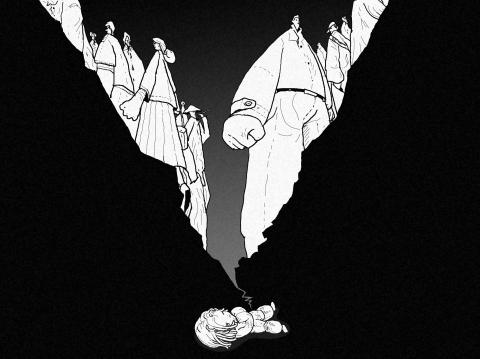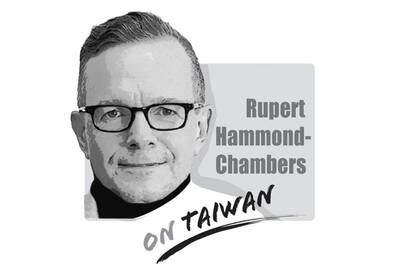Shame on us Chinese. A few days ago, a two-year-old girl was run over twice, about 100m from her home in a hardware market district of Foshan, a prosperous city in southern China. As she lay on the ground, writhing in pain, before being hit by the second vehicle, 18 people, on their bicycles, in cars or on foot, passed by, but chose to ignore her. Among them was a young woman with her own child.
Finally, a 58-year-old female garbage collector came to the girl’s rescue, but it was too late. By the time she was brought to the hospital, the girl, Wang Yue (王悅), nicknamed Yueyue (“Little Joy”), was brain dead and was declared dead. She was a good girl, full of life, her mother said in an interview. She said she had just brought Yueyue back from her kindergarten. She popped out to collect the dry clothes and returned to find Yueyue gone — probably trying to look for her elder brother.
It might have been a different story if one of the 18 people had lent Yueyue a hand. None even bothered to call for emergency services.

Later, when interviewed by a journalist, one of the passersby, a middle-aged man riding a scooter, said with an uncomfortable smile on his face: “That wasn’t my child. Why should I bother?”
Before giving himself up to the police, the driver of the second vehicle, a van, told the media why he had run away.
“If she is dead, I may pay only about 20,000 yuan [US$3,143]. But if she is injured, it may cost me hundreds of thousands of yuan,” he said.
What is wrong with these people? How could they be so cold-hearted? The horrific scene was caught by a surveillance camera and has been watched by millions of viewers since it was posted on Youku, China’s equivalent of YouTube.
This is only the latest incident where tragedy has struck as a result of the callous inactivity of onlookers. Last month, an 88-year-old man fell over face-down at the entrance of a vegetable market near his home. For almost 90 minutes, he was ignored by people in the busy market.
After his daughter found him and called an ambulance, the old man died “because of a respiratory tract clogged by a nosebleed.”
If anyone had turned him over, he might have survived.
Both cases, the death of Yueyue in particular, have provoked much public outrage and a nationwide discussion about morality in today’s China.
From Shanghai, someone with the cybername 60sunsetred wrote: “The Chinese people have arrived at its most morality-free moment!”
There was plenty of condemnation of the cold-heartedness of the passersby, but astonishingly, a large percentage of posters said they understood why the onlookers did not lend a helping hand. Some said they would do the same — for fear of getting into trouble and fear of facing another “Nanjing judge.”
Let me explain the story of the muddle-headed Nanjing judge. In 2006, in the capital of Jiangsu Province, a young man named Peng Yu (彭宇) helped an old woman who had fallen on the street and took her to a hospital and waited to see if the old woman was alright.
However, later the woman and her family accused Peng of causing her fall.
A judge decided in favor of the plaintiff, based on the assumption that “Peng must be at fault. Otherwise why would he want to help?” and that Peng acted against “common sense.”
The outcry from the public in support of Peng forced the court to adjust its verdict and resulted in Peng paying 10 percent of the costs instead of the total. Since that incident, Peng has become a national cautionary tale: the Good Samaritan being framed by the beneficiary of their compassion.
It is true that in China you can get into trouble when you try to help. Weeks ago, I spotted an accident on the fourth ring road in Beijing as I returned home one night. A man was hit by a “black car,” an “illegal taxi,” and his face was all bloody. Watched over by a crowd, the injured man behaved aggressively toward the driver. I got off my scooter. As I tried to pull the two men apart, I was struck myself. When I asked if anyone had reported this to the police, the driver said no. I could not believe that people just stared as if enjoying a free show, without doing anything. I called the helpline and the policemen turned up soon after.
The fundamental problem, in my view, lies in one word that describes a state of mind: shaoguanxianshi, meaning do not get involved if it is not your business. In our culture, there is a lack of willingness to show compassion to strangers. We are brought up to show kindness to people in our network of guanxi, family and friends and business associates, but not particularly to strangers, especially if such kindness may potentially damage your interest.
Fei Xiaotong (費孝通), China’s first sociologist, described Chinese people’s moral and ethical characteristics in his book, From the Soil, in the middle of the last century. He said that -selfishness is the most serious shortcoming of the Chinese.
“When we think of selfishness, we think of the proverb: ‘Each person should sweep the snow from his own doorsteps and should not fret about the frost on his neighbor’s roof,’” Fei wrote.
He offered the example of how the Chinese of that period threw garbage out of their windows without the slightest public concern. Things are much the same today.
Under Mao, citizens were forced to behave themselves in both public and private spheres. Every March, people were obliged to go into the street to do good deeds: cleaning buses, fixing bicycles and offering haircuts. Now relaxed social control and commercialization over the past three decades have led people to behave more selfishly again.
People are enjoying, and sometimes abusing, the vast personal freedoms that did not exist before. To start with, it is now safe to be “naughty.” Back in the early 1980s, when I worked at a rocket factory in Nanjing, one of my colleagues, a married man, was caught having an affair with an unmarried woman. He was given a three-year sentence in a labor camp and the girl was disgraced. In today’s society, having extramarital affairs or keeping an ernai — second wife or concubine — is as common as “cow hair,” as the Chinese would say. For a novel I am writing on prostitution, I have interviewed many prostitutes and ernai. Many see their profession as a way to gather wealth quickly, feeling few moral qualms.
China’s moral crisis does not just manifest itself in personal life, but also in business practice and many other areas. The high-profile “poisoned milk powder” case and the scandal of using “gutter oil” as cooking oil have shocked and disgusted people around the world. Last year an article, “Why have Chinese lost their sense of morality?” in which the author tried to find an explanation, was widely read. He reasoned that China has introduced the concept of a market economy from the West, but failed to import the corresponding ethics, while the traditional moral principles of China no longer fit the market economy model.
There is a lot of sense in that. I believe that the lack of a value system is also deepening the moral crisis. Before Mao, the indifference toward others once so accurately described by Fei existed, but was mitigated by a traditional moral and religious system. That system was then almost destroyed by the communists, especially during the 10 mad years of the Cultural Revolution from 1966 to 1976. These days, communism, the ideology that dominated Chinese people’s lives like a religion, has also more or less collapsed. As a result, there is a spiritual vacuum that cannot be filled by the mere opportunity of money-making.
To drag China out of its moral crisis will be a long battle. The pressing question is how to make people act in cases of emergency and the solution is law. After the “Nanjing case,” there have been discussions about introducing a law that imposes a “duty of rescue” as exists in many European countries. I am all for it, because that is probably the only way to propel action for a people who do not see a moral obligation in rescuing others.
The Yueyue incident revealed an ugly side of China. I hope the entire nation will take the opportunity to take a hard look at ourselves and ask ourselves what is wrong with society. There is at least hope in the action of the garbage collector who rushed to Yueyue’s side without hesitation.
China’s economy is galloping like a horse without reins and its position in the world is rising. We Chinese have every reason to feel proud about what we have achieved. Now we demand respect, but how can we possibly win respect and play the role of a world leader if this is a nation with 1.4 billion cold hearts?
Having lived through former British prime minister Boris Johnson’s tumultuous and scandal-ridden administration, the last place I had expected to come face-to-face with “Mr Brexit” was in a hotel ballroom in Taipei. Should I have been so surprised? Over the past few years, Taiwan has unfortunately become the destination of choice for washed-up Western politicians to turn up long after their political careers have ended, making grandiose speeches in exchange for extraordinarily large paychecks far exceeding the annual salary of all but the wealthiest of Taiwan’s business tycoons. Taiwan’s pursuit of bygone politicians with little to no influence in their home

In 2025, it is easy to believe that Taiwan has always played a central role in various assessments of global national interests. But that is a mistaken belief. Taiwan’s position in the world and the international support it presently enjoys are relatively new and remain highly vulnerable to challenges from China. In the early 2000s, the George W. Bush Administration had plans to elevate bilateral relations and to boost Taiwan’s defense. It designated Taiwan as a non-NATO ally, and in 2001 made available to Taiwan a significant package of arms to enhance the island’s defenses including the submarines it long sought.
US lobbyist Christian Whiton has published an update to his article, “How Taiwan Lost Trump,” discussed on the editorial page on Sunday. His new article, titled “What Taiwan Should Do” refers to the three articles published in the Taipei Times, saying that none had offered a solution to the problems he identified. That is fair. The articles pushed back on points Whiton made that were felt partisan, misdirected or uninformed; in this response, he offers solutions of his own. While many are on point and he would find no disagreement here, the nuances of the political and historical complexities in
Taiwan faces an image challenge even among its allies, as it must constantly counter falsehoods and misrepresentations spread by its more powerful neighbor, the People’s Republic of China (PRC). While Taiwan refrains from disparaging its troublesome neighbor to other countries, the PRC is working not only to forge a narrative about itself, its intentions and value to the international community, but is also spreading lies about Taiwan. Governments, parliamentary groups and civil societies worldwide are caught in this narrative tug-of-war, each responding in their own way. National governments have the power to push back against what they know to be